Working Group of the Plenary kicks off
The first meeting of the Working Group of the Plenary (WGPL) took place on Wednesday, 22 October 2014, under the group's Chairman Musab Abdulla (Bahrain). Mr Abdulla gave an overview of the proposals allocated by the Plenary to his group (Document
DT/7).
In total, WGPL will review 81 proposals and 334 pages of text in 15 sessions, representing 33 hours of work. In view of this workload, the Chairman sought the support of all delegations to limit the number of ad hoc groups and resolve proposals in an efficient manner. A number of regional common proposals were then presented and discussed, as highlighted below.
Resolution 70 (Rev. Guadalajara 2010) − "Gender mainstreaming in ITU and the promotion of gender equality and the empowerment of women through information and communication technologies"
The first set of proposals to be discussed (
IAP/34R1-A1/8,
AFCP/69A1/7,
ARB/79A2/4 and
EUR/80A1/21) were presented by the Dominican Republic, Egypt (for both the African and Arab Common Proposals) and Switzerland.
The Islamic Republic of Iran, Canada, Indonesia, Japan and Morocco took the floor to express support for the proposals. These delegations highlighted the importance of continuing the work of ITU in this domain, the importance of ITU leading by example and becoming an organization that mainstreams gender equality in its internal policies. Several speakers then highlighted the linkage between this resolution and Resolution 48 (Rev. Guadalajara, 2010) on "Human resources management and development", to be discussed in Committee 6 (Administration and Management).
The chairman requested the delegation of the Dominican Republic to consolidate the four proposals to amend Resolution 70 into a single text and to report back on progress achieved to the fourth meeting of WGPL, scheduled for Friday 24 October (afternoon). All interested parties were invited to work with the Dominican Republic.
Resolution 136 (Antalya, 2006) − "The use of telecommunications/information and communication technologies for monitoring and management in emergency and disaster situations for early warning, prevention, mitigation and relief"
The second set of proposals (IAP/34R1-A1/30,
ACP/67A1/12
and
IND/85/1) call for a revision of Resolution 136. These proposals were presented by the Bahamas, Viet Nam and India.
Argentina, Indonesia, Egypt, the Russian Federation, the Islamic Republic of Iran, United States, Canada, Mali, New Zealand, Japan, United Arab Emirates, Bahamas, the Republic of Korea, Zimbabwe and Sweden took the floor to express their support for the proposals presented. They emphasized the importance of international coordination in telecommunications and ICT in emergency and disaster situations for early warning, prevention, mitigation and relief. Some delegations stressed that the revised resolution should be forward looking and should avoid making references to specific technological solutions.
After an exchange of views, WGPL agreed to create an ad-hoc group to revise Resolution 136 taking on board the comments received. Stephen Bereaux (Bahamas) was asked to chair this group, which will also report back to WGPL on Friday, 24 October (afternoon). The secretariat of the group will be provided by Cosmas Zavazava (ITU Telecommunication Development Bureau).
Resolution 35 (Kyoto, 1994) − "Telecommunication support for the protection of the environment"
The third set of proposals (EUR/80A1/13 and
UAE/86/3)
call for the abrogation of Resolution 35. These proposals were presented by the United Kingdom and the United Arab Emirates, respectively.
Japan, the Islamic Republic of Iran, Egypt, Canada, Lithuania, the Russian Federation, the Republic of Korea, Kenya, Morocco, and Uganda took the floor to highlight the overlap between Resolutions 35 and 182 ("The role of telecommunications/information and communication technologies on climate change and the protection of the environment") and supported abrogating Resolution 35. However, a number of delegations stressed that in the event of an abrogation of Resolution 35, all its provisions would have to be integrated into a revised version of Resolution 182.
After an exchange of views, the chairman took note of the comments received and proposed to revert to the issue, together with the proposals to revise Resolution 182, at a future meeting of the group.
Committee 3 (Budget Control)
The Budget Control Committee also held its first meeting on 22 October under its Chairman, Paarock Vanpercy (Ghana). A number of documents, including the Memorandum of Arrangement between the Republic of Korea's Ministry of Science, ICT and Future Planning and ITU; the budget of the Plenipotentiary Conference (PP-14) and the contribution to defraying the expenses of this conference were presented by Thierry Perewostchikow (ITU secretariat).
Explanations were given regarding both the calculation of the contribution to defraying the expenses of the conference and the list of participants exempted or not from this contribution. The final list of these participants will be included in Committee 3's report to the Plenary.
Policy statements in brief
Thailand: Pornchai Rujiprapa, Minister, Ministry of Information and Communication Technology, shared Thailand's perspective and commitment towards the vision and targets under ITU's Connect 2020 framework, which he said are perfectly aligned with the new policy of the Thai government to formulate strategies for the digital economy.
Tunisia: Mohamed Ben Amor, Deputy Minister, Ministry of Higher Education Scientific Research and ICT, speaking on behalf of Tawfik Jelassi, the Minister, said Tunisia aims to use ICT to strengthen democracy in the country and to enable all of its citizens to be on an equal footing to participate in society. He also said efforts must be stepped up to implement the WSIS outcomes.
Somalia: Mohamed Ibrahim, Minister, Ministry of Posts and Telecommunications, emphasized the importance of developing local language content so that all people could benefit from the advantages afforded by cyber technologies and services.
Zimbabwe: Win Mlambo, Deputy Minister, Ministry of Information and Communications Technology, said the government, with key stakeholders, will complete a National Broadband Plan by 20 June 2015 and is using low-cost satellite solutions to promote broadband services countrywide. He saluted ITU work in developing global standards that have seen the country transition from 9Kbit/s 2G to 4G broadband speeds.
Nepal (Republic of): Dr Minendra Prasad Rijal Minister, Ministry of Information and Communications, expressed full support for and commitment to the Connect 2020 framework and expressed the hope that PP-14 will help develop a road map for their achievement.
Iraq: Amir Khadr, Senior Deputy Minister for Technical Affairs, Ministry of Communications, stressed the importance of cybersecurity and online privacy protection, issues that should be high on the agenda of PP-14.
Ghana: Edward Kofi Omane Boamah, Minister, Ministry of Communications, said WSIS targets were progressively being met in Ghana and called on ITU to step up its work in relation to the challenges posed by climate change, environmental protection, gender equality, and the needs of people with disabilities. "The youth of the world are our primary resource. We need to involve them in ICT policy-making," he added.
Cuba: Jorge Luis Perdomo Di-Lella, Vice Minister, Ministry of Communications, condemned the use of cyberspace to spy on others as a violation of international law and State sovereignty. He also recalled national efforts to ensure free access to cyber technologies and services for all citizens, as well as Cuba's ICT training programmes in universities and other forums.
Papua New Guinea: Paulias Korni, Permanent Secretary, Department of Communication and Information Technology, said PP-14 will set a clear path towards ITU's Connect 2020 vision for the future. Despite progress made in the ICT sector, he said much remains to be done to connect the population and advance broadband roll-out and was confident that ITU would continue to provide guidance and direction in the areas of standards, radiocommunication and ICT development.
Nigeria: Omobola Johnson, Minister, Federal Ministry of Communication Technology, stated that "through the implementation of our National ICT Policy, National Broadband Roadmap, and Guidelines for Nigerian Content in ICT, we are bringing greater clarity and predictability to the Nigerian ICT sector." She reaffirmed that the country's policy framework is in line with ITU's Strategic Plan for 2016-2019. She also spoke of how Nigeria fought to contain the Ebola virus using ICT. For example, a "phone app helped in reducing reporting times of infections by 75 per cent: test results were scanned to tablets and uploaded to emergency databases and field teams got text message alerts on their phones informing them of the results."
Malawi: Kondwani Nankhumwa, Minister, Ministry of Information, Tourism and Civic Education, said the country recognizes ICT as a key pillar for economic development as evidenced by its inclusion in the Malawi Growth and Development Strategies and the enactment of a National ICT Policy to guide the development of the sector. Malawi has embraced all aspects of ITU's Connect 2020 vision, which will facilitate bridging the digital divide.
Cameroon: Jean-Pierre Biyiti Bi Essam, Minister, Ministry of Posts and Telecommunications, said ensuring cybersecurity is a priority in Cameroon and commended ITU assistance in this regard, and recalled the country's commitment to compliance with WSIS principles.
Rwanda: Jean Philbert Nsengimana, Minister, Ministry of Youth and ICT, said ICT should be at the centre of the Post-2015 Development Agenda and Sustainable Development Goals, and that Rwanda has worked with ITU on broadband roll-out over the past 10 years. He reiterated Rwanda's financial commitment to the capacity-building "Transform Africa Scholarship Fund". Rwanda, he added, will also continue contributing to the ITU Accessibility Fund for digital inclusion of persons with disabilities.
Mozambique: Gabriel Muthisse , Minister, Ministry of Transport and Communications , said harmonization will enable better planning, coordination, mobilization of financial, and material and human resources to achieve the ITU Connect 2020 vision, and that Mozambique remains committed to expanding communications in remote areas and providing universal service access.
Jamaica: Phillip Paulwell, Minister, Ministry of Science, Technology, Energy and Mining, encouraged ITU to expand existing programmes and to establish new ones that focus on the developmental needs of small island developing States (SIDS) that are vulnerable to climatic as well as global economic shifts. Jamaica also called on ITU to continue supporting the work of regional institutions such as the Caribbean Telecommunications Union.
Germany: Dr Norbert Riedel, Ambassador, Commissioner for International Cyber Policy,
Federal Foreign Office, called ITU "a true success story". He added that "in order to follow this highly successful path, ITU should stick to its core competences".
Swaziland: Dumsani Ndlangamandla, Minister, Ministry of Information, Communication and Technology, said the digital television network now being built will provide extra capacity for data services to connect outlying government offices and clinics as part of a large-scale e-government. A process is also under way through the communications regulator working with international partners to establish a computer emergency response team (CERT) to deal with cyberthreats and formulate policies and standards to ensure a trustworthy cyber environment.
Chile: Pedro Huichalaf Roa, Undersecretary, Undersecretariat of Telecommunications, reaffirmed Chile's support for ITU's Connect 2020 vision and framework.
Kuwait: Jasem Albudaiwi, Ambassador, Embassy of the State of Kuwait-Seoul, said Kuwait is working hard, with ITU assistance, to build cyber capacities, especially for young people, women, the elderly and persons with special needs, in order to make them more autonomous and to overcome digital illiteracy.
Palestine: Mahmood Diwan, Director General, Ministry of Telecommunications and Information Technology, said Palestine is developing its digital capacities and has relevant legislative and regulatory frameworks in place. Also, it is encouraging young people to demonstrate innovation and creativity by setting up centres of excellence in universities.
Niger: Abdou Malam Garba, Secretary General, Ministry of Posts, Telecommunications, and the Digital Economy, said Niger's strategic plan adopted in 2013 is in perfect harmony with ITU's Connect 2020 vision, and commended ITU efforts to promote implementation of WSIS Action Line C5.
Turkey: Tayfun Acarer, Chairman of the Board, Information and Communication Technologies Authority (ICTA), said Turkey is focused on achieving a major set of goals within its Strategic Vision 2023 framework towards economic expansion, a knowledge-based society, building an intercontinental hub for ICT, and enhancing high-speed broadband access for all.
Georgia: Irakli Kashibadze, Chairman of Innovation and Technology Agency, Ministry of Economy and Sustainable Development, described how ICT had simplified and speeded up public services and a government plan to make broadband access available to all citizens.
Vanuatu: Jackson Miake, ICT Program Manager, Vanuatu Government, said the country is one of the world's most natural disaster-prone countries and in need of robust ICT solutions to forecast them and mitigate their impacts. Vanuatu, he added, fully supports ITU's Connect 2020 framework.
Italy: Fabio Bigi, Advisor, Ministry of Economic Development, said Italy had introduced regulations to foster trust in the use of cyberspace technologies and services, and that the country recognized the value of ITU activities, in particular in the fields of radiocommunication, standardization and telecommunication development.
Colombia: Franklin Merchán Calderon, Advisor, Ministry of Information and Communication Technologies, said the main objective of PP-14 should be to accelerate the process of closing the digital gap.
Indonesia: Muhammad Budi Setiawan, Vice Minister, Ministry of Communication and Information Technology, said developing countries had a hard time catching up with technological progress in the digital age and that ITU should play a more prominent role in this respect. He commended ITU's Connect 2020 information society strategy.
Burundi: Tharcisse Nkezabahizi, Minister, Ministry of Telecommunications, Information, Communication and Relations with Parliament, emphasized the priority needs to reinforce international cooperation in the areas of spectrum allocation, cybersecurity, and providing digital education to young people in least-developed countries.
Djibouti: Ali Hassan Bahdon, Minister, Ministry of Communication, Posts and Telecommunications, said ICT development in Djibouti had surpassed all expectations and expressed his confidence that ITU would continue to play a prominent role in closing the digital gap.
Lao P.D. R.: Hiem Phommachanh, Minister, Ministry of Posts and Telecommunications, thanked the Republic of Korea and ITU for their assistance in developing the ICT sector in the country, and stressed the priority need for more local language Internet content to increase use of digital technologies and services.
Paraguay: Eduardo Neri González Martínez, President, National Commission of Telecommunications, stated that Paraguay considered access to a trustworthy cyberspace environment as a right for all citizens, and underlined the special challenges of landlocked countries to make ICT available to all as well as the key role of public-private partnerships in this regard.
Costa Rica: Allan Ruíz Madrigal, Vice Minister of Telecommunications, Ministry of Science, Technology and Telecommunications, said that as a defender of freedom of expression Costa Rica considers it essential that youth, women, people with disabilities, and rural and indigenous populations have free access to ICT. He also called for greater harmonization of spectrum allocation, with ITU assistance.
Bangladesh: Zunaid Ahmed Palak, State Minister, Ministry of Posts, Telecommunications and Information Technology, said Bangladesh fully supported ITU's Connect 2020 framework, and that the country aimed to achieve respectively 35 and 70 per cent broadband and Internet penetration by 2018. He noted that Bangladesh received the 2014 public sector excellence award from the World Information Technology and Services Alliance (WITSA).
South Sudan: Rebecca Joshua Okwaci, Minister, Ministry of Telecommunications and Postal Services, delivering her country's first-ever official Plenipotentiary Policy statement, said her country had made big steps towards ICT development since it acquired independence three years ago thanks in large part to ITU assistance. In what may be the first instance of crowd participation during delivery of policy statements at an ITU Plenipotentiary Conference, Minister Okwaci led delegates in an impromptu, celebratory chant of "Oyee ITU".
Democratic Republic of the Congo: Tryphon Kin-Kiey Mulumba, Minister, Ministry of Posts, Telecommunications and ICT, outlined the national ICT development programme and achievements as well as that country's assistance in the ICT sector to neighbouring countries.
Israel: Uri Shraga Gutman, Ambassador of Israel to the Republic of Korea, Ministry of Foreign Affairs, recalled that regulatory and legislative frameworks had not kept pace with rapid technological developments, and underlined efforts in Israel to increase cybersecurity. He also commended ITU's Connect 2020 framework and said Israel would continue to offer capacity-building training to developing countries.
Samoa: Tuisugaletaua Sofara Aveau, Minister, Ministry of Communications and Information Technology, expressed the hope that ITU would continue to play a pivotal role in the ICT sector and recalled that ITU assistance had been crucial in helping Samoa to develop a national early warning system.
Philippines: Louis Napoleon Casambre, Undersecretary, Department of Science and Technology, recalled that Philippines was located in the Pacific "Ring of Fire" and thanked ITU for its assistance following the devastation caused by Typhoon Haiyan.
France: David Martinon, Ambassador, Ministry of Foreign Affairs, expressed the hope that ITU would play a more prominent role in global standard setting in the sectors within its purview.
Namibia: Simon Maruta, Ambassador to Austria, Ministry of Foreign Affairs, reaffirmed Namibia's support for ITU's Connect 2020 framework and said he was confident that, with ITU assistance, it would meet the ITU deadline to make the analogue to digital switchover.
|
Quick Links
Photos and Videos
ITU PP14 NEWS CLIPS: ITU Secretary-General Election
ITU SOUNDBYTES: Gem-Tech Awards 2014 - Veena Rawat
ITU 2014 VIDEO
ITU PP14 NEWS CLIPS: Gem-Tech Women's Ministerial Breakfast
ITU PP14 INTERVIEW:Jean Philbert Nsengimana Minister, Youth And ICT, Republic of Rwanda
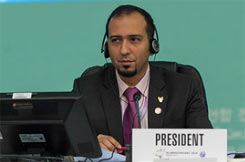
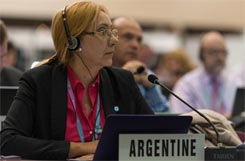
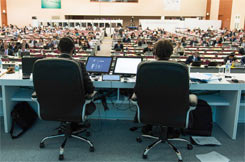
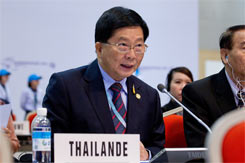
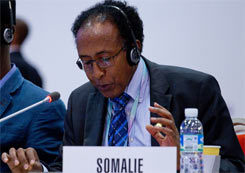
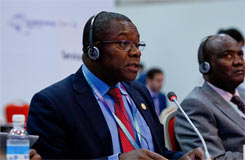
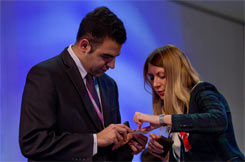
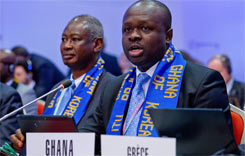
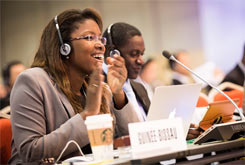
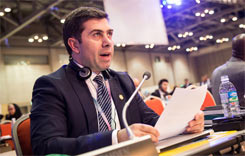
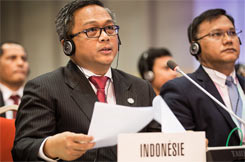
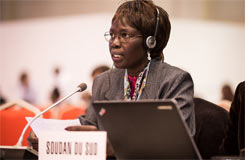
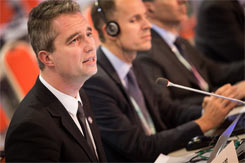
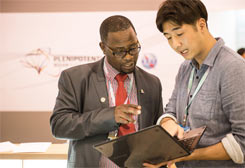
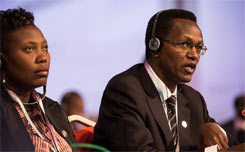
|
|
